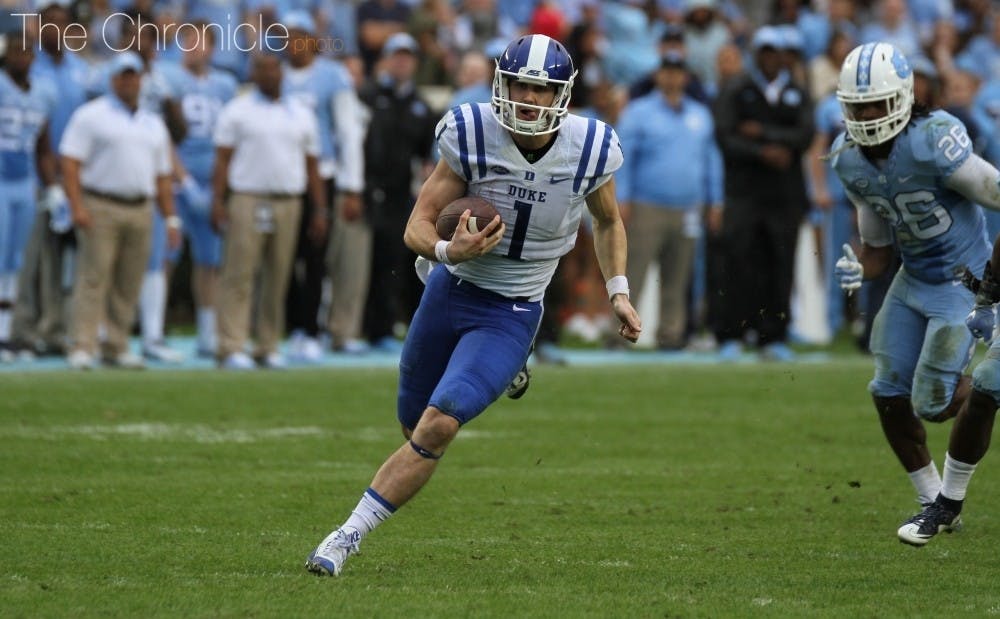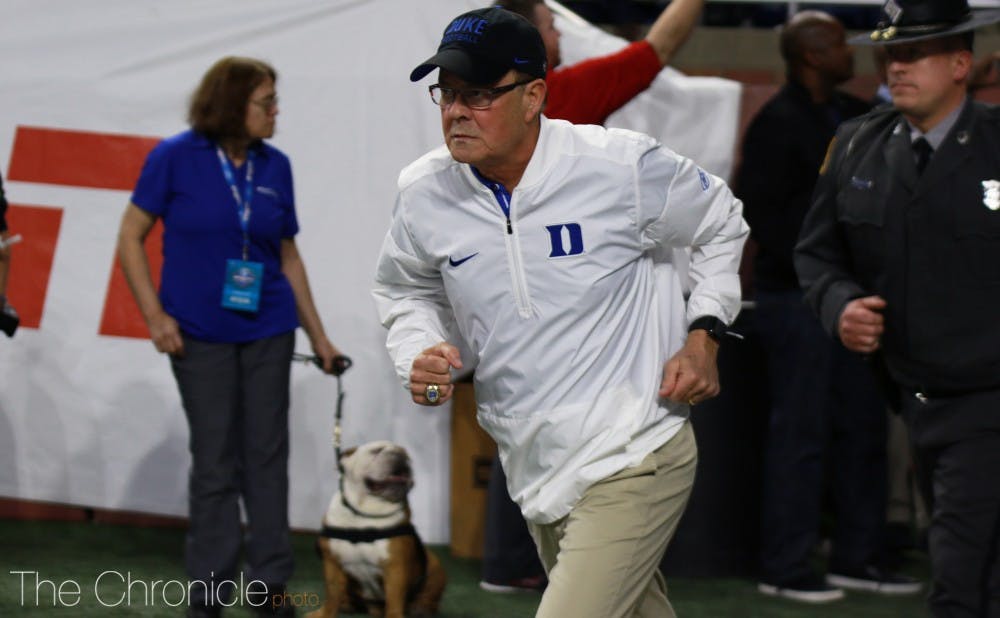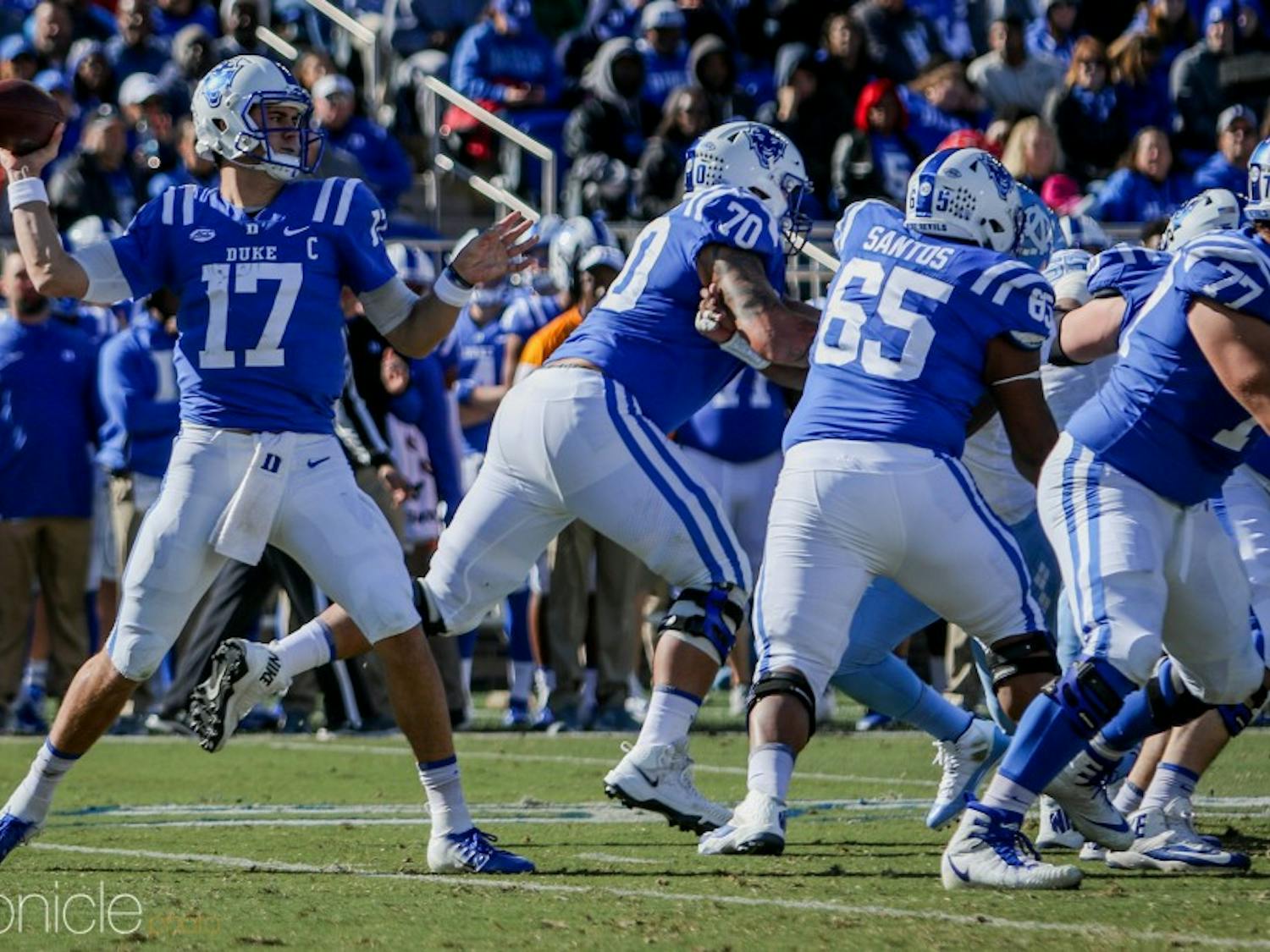Ten years ago Thursday, Wallace Wade Stadium was filled with optimism and hope, a rare occurrence for a program plagued by incessant defeat.
More than 32,000 spectators filled the stands for the 2008 season opener against James Madison—the stadium’s largest attendance total at that point since 1994—despite the fact that the Blue Devils were coming off of a dismal 1-11 campaign. In head coach Ted Roof’s entire four-year tenure, which ended following the 2007 season, they won just six games.
Newly-hired head coach David Cutcliffe had somehow inspired Duke students and fans to show up, despite his program having gone without a bowl victory since 1961 and in the midst of 13 straight losing seasons.
“I remember very vividly a feeling coming down the tunnel versus James Madison in the first game here,” Cutcliffe said on a conference call in early August. “There was a nervousness that’s always there, but such an energy and enthusiasm and an appreciation for working with these young men…. The guys that are coming down the tunnel [today] are products of a culture, and that culture started fast.”
Cutcliffe was a proven winner, earning SEC Coach of the Year honors in 2003. He also had a strong track record developing quarterbacks, most notably both Eli and Peyton Manning at Ole Miss and Tennessee, respectively.
“Everyone wants to win, but you have to have the knowledge of how to do it, and he knew how to do it,” said former Blue Devil athletic director Joe Alleva, who now holds the same position at LSU. “When I interviewed him, it took me about 10 minutes to realize he was the right guy…. He had the right philosophy and the right plan to get it going. It all started with recruiting and he’s done a great job of bringing in quality players that can play in the ACC.”
'Tired of losing'
While Cutcliffe’s initial recruiting class would not take the field until the following season, much of the foundation and culture change was established from the get-go. In the first eight months of his tenure, prior to the 2008 opener, Cutcliffe stressed the need to improve his team's conditioning and focus.
“We had to get serious about football,” said Thad Lewis, the Blue Devils' starting quarterback from 2006-09. “We weren’t focused as a team, going out on Thursday night before a game on a Saturday. He cut all of that out, and so he made something that was pretty funny and laughable to the rest of the ACC, he made us contenders.”
Duke was bullied throughout Roof’s tenure. From 2004-07, it lost by at least three touchdowns on 22 occasions, and there was no clear path out of the rut.
The Blue Devils' facilities were also nowhere near the elite level of their ACC counterparts.
Alleva said the plans for the recent renovations in and around Wallace Wade were drawn up prior to his departure in 2008, but at the time of Cutcliffe’s arrival, the team’s recruiting ceiling was low. Due to the lack of indoor facilities and no full practice field or stadium solely for football—Wallace Wade had a track around the field until 2014—in addition to the lack of a competitive product on the field, Duke was far from a destination for top prospects.
The university realized major changes needed to be made to rebuild the program, and Cutcliffe was tasked with bringing the Blue Devils back to national prominence.
“A university has to make a commitment to a sport like football, and I think Duke finally made a commitment to do that,” Alleva said. “Duke was just tired of losing. It was an embarrassment to the school to have a football team with that kind of record, so I think the embarrassment kind of got them going to support the program.”
Using the renovation plans in addition to his culture changes, Cutcliffe was able to effectively pitch his vision to recruits and convince those who would be fringe role players at larger schools to come to Duke, where they could be a major part of the program's new era.
“People thought I was crazy,” said current Blue Devil radio analyst and former captain Dave Harding, who chose Duke over Florida State and South Carolina. “I had a coach in high school stop talking to me when I committed to Duke.”
Cutcliffe's first recruiting class included the likes of Ross Cockrell, Sydney Sarmiento and Harding. Although the trio all redshirted as freshmen in 2009, their growth with the team and the program provided critical leadership later on—but it wouldn’t have been possible without the upperclassmen working to change, believing and buying in from the beginning.
“He told us this is not going to be an overnight job and the first few years are going to be rough,” Lewis said of Cutcliffe's message at the end of 2009. “He said, ‘You guys that are sitting in this room won’t be playing in the game when we’re playing for an ACC championship. But you guys are more than welcome, and I’ll make sure you guys are able to come back, because you’re the stepping stone of that.’”

'Getting closer and closer and closer'
The Blue Devils made quick progress in 2008, jumping out to a 3-1 record with Cutcliffe earning his first conference win in a 31-3 onslaught against Virginia on Sept. 27. Duke finished that season 4-8, however, after struggling down the stretch in conference play.
“Disciplining and conditioning hasn’t changed at Duke. We don’t want to change that,” Cutcliffe said of initial changes that are still around today. “Our commitment to team, and the focus on team and not self—our early teams, our ’08 and our ’09 teams, were exceptional at that.”
The next three seasons proved to be much of the same with records of 5-7, 3-9 and 3-9. With recruiting improving and the program becoming more in the Cutcliffe mold, the Blue Devils set the stage to break their 17-year bowl drought in 2012.
Entering its matchup against Virginia Tech on Oct. 13, 2012, Duke finally had an opportunity to clinch bowl eligibility after getting off to a 5-1 start. The Blue Devils fell 41-20, putting immense pressure on a contest against North Carolina the following week with a pair of top-15 matchups looming.
After being outscored 21-3 in the first 12 minutes of the fourth quarter, Duke found itself down four. Needing 87 yards to guarantee their first bowl appearance since 1994, quarterback Sean Renfree led the Blue Devils down the field and connected with Jamison Crowder in the end zone on a fourth-and-2 with 13 seconds remaining.
It was Duke's first victory against North Carolina since 2003 and certainly the peak of the Cutcliffe era to that point.
“We could feel ourselves getting closer and closer and closer, and that’s when we finally got up over the hill and were finally able to get over whatever had been holding on to us,” Harding said. “Once that 2012 team got a taste of victory, it wasn’t something that we were going to give up.”
The Blue Devils fell to Cincinnati 48-34 in a Belk Bowl heartbreaker that December, finishing the 2012 season with a 6-7 record.
While the Blue Devils—led by then-seniors Harding, Sarmiento and Cockrell—were confident in the growth of the program entering 2013, the media did not have the same optimism, picking Duke to finish last in the ACC Coastal.
The Blue Devils got off to a 2-2 start with starting quarterback Anthony Boone forced to miss nearly a month due to injury, but they clicked upon his return, closing out the regular season with eight consecutive victories including a pair of wins against ranked Virginia Tech and Miami teams. Duke won the ACC Coastal title, setting up a battle with Jameis Winston and top-ranked Florida State in the 2013 ACC championship.
“It was just a bunch of people that were highly motivated and had all been recruited to Duke to do that one thing, and that was to win the ACC Coastal Division and get to the championship game,” Harding said of the Blue Devils’ run. “We believed going into the year, regardless of what the press said, that we were going to make waves, and we ended up doing it."

What's next?
Although Duke did not emerge victorious against the Seminoles or against Texas A&M in the Chick-fil-A Bowl—despite a 21-point halftime lead against quarterback Johnny Manziel's Aggies—the 2013 Blue Devils' run is largely considered the highlight season of the Cutcliffe era, coming in just his sixth year with the school.
Cutcliffe finally helped the Blue Devils to their first bowl victory since 1960 two years later. After a 7-5 2015 regular season, Duke earned a trip to New York to take on Indiana in the Pinstripe Bowl at Yankee Stadium.
After narrowly losing three consecutive postseason appearances, quarterback Thomas Sirk and the Blue Devils felt some extra weight on their shoulders.
“I remember the feeling that it wouldn’t be good enough to just go to New York and not win this bowl game,” Sirk said. “This was a game that we had to win and being a team leader and starting quarterback, I knew that we had to transform this program right here. This could be a defining moment for us going forward and can help the program continue to grow from what Coach Cutcliffe had already done.”
The Blue Devils filled the 55-year void, escaping with a 44-41 overtime victory as Indiana barely could not convert a long field-goal attempt to send the contest to double overtime.
With the Pinstripe Bowl victory and a Quick Lane Bowl win last December, Cutcliffe has assembled quite the resume during his first decade at Duke. The Birmingham, Ala., native has led Duke to four winning seasons, five bowl appearances, two bowl victories and an ACC championship appearance while also transforming Duke football both on and off the field.
So what’s in store for the next 10 years?
While so much progress has been made, Cutcliffe knows his program must continue to evolve and improve. Otherwise, Duke will be in danger of regressing to the program's many fraught years. The 63-year-old coach has committed to finishing his career with the Blue Devils, dismissing the Tennessee head coaching job three different times during his tenure at Duke.
“You can’t hang onto anything,” Cutcliffe said. “There are so many things that we’re improving upon, and then you hopefully grow another area as you start recruiting well—our depth. You hope to become a combination of all that part of the culture while improving every step the way.”
Winning bowl games has quickly become the benchmark for the Blue Devils. But ultimately, the program has higher expectations for the future.
“The next big step for our program is to win an ACC championship and eventually compete in the college playoffs and win a national championship,” Sirk said. “It’s not just about talking about the next steps—Coach Cutcliffe puts some things in place to achieve them.... Anything that we need to take that next step in our program, Coach Cutcliffe is going to go above and beyond to make that happen."


